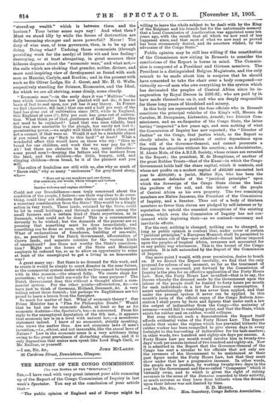[TO TIM BIHTOR OP THN "EleacreTon..1 SIB,—I have read with
very great interest your able summing up of the Report of the Congo Commission of Inquiry in last week's Spectator. You say at the conclusion of your article that—.
"The public opinion of England and of Europe might be willing to leave the whole subject to be dealt with by the King of the Belgians and his friends but for the unfortunate memory that a local Commission of Amelioration was appointed some ten years ago, with the result that all which we now read of has happened since, and that most of what we now read as proved has been strenuously denied, and its asserters vilified, by the advocates of the Congo State?'
Public opinion may be still less willing if the constitutioN of the Commission now sitting in Brussels to consider the conclusions of the Report is borne in mind. The Commis- sion is composed of a President and thirteen members. The President is a distinguished Belgian Magistrate, and the only remark to be made about him is surprise that he should have consented to take the chair over a body composed—or virtually so—of men who owe everything to the system which has decimated the peoples of Central Africa since its in- auguration by Royal Decree in 1891-92; who are paid by it, have made themselves on it, and who are deeply responsible for these long years of bloodshed and misery.
In this body are represented the four officials who in Brussels constitute the principal vehicles of the King's will, Messrs. de Cuvelier, M. Droogmans, Liebrechts, Arnold; two District Com- missioners, and an ex-Inspector of the Congo State, the latter having "inspected" a few years ago, and seen nothing of what the Commission of Inquiry has now reported ; the "Director of Justice" on the Congo, that justice which, as the Report so clearly admits, is in a position of entire dependence upon the will of the Governor-General, and cannot prosecute a European for atrocities without his sanction ; an Administrator, M. Alexis Mole, of the A.B.I.R. Society, whose crimes are revealed in the Report ; the president, M. de Hemptinne, of another of the great Rubber Trusts—that of the Kasai—in which the Congo Government holds half the share capital, which it controls, and whose net profits on a modest capital of £40,000 amounted last year to £200,000; a jurist, Maitre Nys, who has been the most earnest defender of the "juridical principles" upon which the Sovereign of the Congo State claims the land the produce of the soil, and the labour of the people of Central Africa as his own property. The two remaining members are Maitre Janssens, the President of the Commission of Inquiry, and a Senator. Thus out of a body of thirteen members no fewer than eleven are pledged by self-interest or by reputation to uphold the essential conceptions of the existing system, which even the Commission of Inquiry has not con- demned while deploring their—as we contend—necessary and inevitable effects.
For the rest, nothing is changed, nothing can be changed, so long as public opinion is content that, under cover of certain "juridical principles," a European Monarch shall be permitted to raise revenues out of the—now admitted—forced labour imposed upon the peoples of tropical Africa, revenues not accounted for in any public way whatsoever. This is the kernel of the Congo question. It is left untouched by the Report of the Commission of Inquiry.
One more point I would, with your permission, desire to touch on. If we dissect the Report carefully, we find that the only proposal for reform of any moment, so far as the treatment of the natives is concerned, put forward by the Commission of Inquiry is the plea for an effective application of the Forty Hours Law. Now, the Forty Hours Law so-called—that is to say, the Decree whereby the demand made by the Government upon the labour of the people shall be limited to forty hours per month for each individual—is a law for European consumption. I assert unhesitatingly that it has never been applied, and that under the present system it never can be applied. In this month's issue of the official organ of the Congo Reform Asso- ciation I shall prove by facts and figures that under such a law the output of indiarubber from the Congo—the mainstay of revenue—would fall to vanishing point, and that the State, which exists for rubber and on rubber, would collapse.
But even without such a demonstration the Report itself affords evidential value of the Forty Hours Law. The Report admits that under the regime which has prevailed hitherto the rubber worker has been compelled to give eleven days in every fortnight to the harvesting of indiarubber for his task-masters; in other words, two hundred and eighty-six days per annum. A Forty Hours Law per month would involve him in twenty-two days' work per annum instead of two hundred and eighty-six. Now it is admitted in the Report that the Governor-General of the Congo has sent a circular to his officials that not only are the revenues of the Government to be maintained at their past figure under the Forty Hours Law, but that they must show under that law a progressive increase. In other words, the people are to produce, by working twenty-two days in the year for the Government and the so-called " Companies " which it virtually owns, and to which is given the right of raising revenues in the areas of the Domaine conceded to their activity, as much revenue as they have done hitherto when the demand upon their labour was not limited by time.
—I am, Sir, &c., E. D. M0RBL, Hon. Secretary, Congo Reform Association,,


































































 Previous page
Previous page